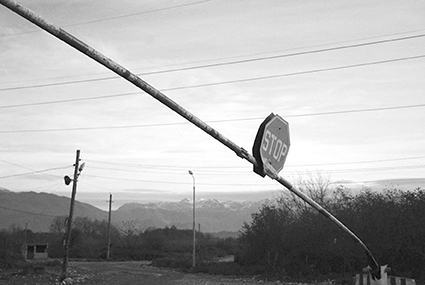MFA Report Reveals Human Rights Violations on Occupied Territories
On June 6, the Georgian Foreign Ministry (MFA) released its first quarterly report of 2016 assessing the human rights situation in the occupied regions of Georgia.
The document highlights that two Georgian territories, Abkhazia and Tskhinvali regions, still remain under Russia’s occupation and Georgians living on the ground face gross violations of their fundamental rights. “The ethnic Georgians still living in Abkhazia are often subjected to restrictions on their freedom of movement, restrictions concerning receiving education in their native language, as well as forced passportization.”
Since January 2013, the Russian occupation forces have intensified the process of installation of razor wire and barbed wire fences and other artificial obstacles along the occupation lines in Abkhazia and Tskhinvali regions. Currently, the total length of artificial barriers along the occupation line in Tskhinvali Region is nearly 51 km. Razor and barbed wire fences cover a stretch of more than 12 km in the Abkhazian region, the document emphasizes.
The report underlines the fact that in the reporting period, February this year, de-facto president of Abkhazia Raul Khajimba signed a so-called “law on the legal status of foreign citizens in Abkhazia.” The MFA is concerned that the regulation is aimed at qualifying ethnic Georgians living in Abkhazia as foreign citizens and discriminating against them in numerous ways.
“There is a threat that such so called “laws” can become grounds for another wave of ethnic cleansing,” the MFA warns. “The adoption of the above-mentioned so called “laws” are directly linked to the new illegal wave of “passportization” on the occupied territories.”
The report mentions that over 300,000 documents, including passports and residence permits, were processed in the Russian Federation to be distributed throughout the two occupied regions.
Additionally, the MFA document states that the practice of torture and ill-treatment in the occupied regions remain an issue of concern that has been attested to by various sources made available in the reporting period. “Individuals detained in the Russian-occupied Tskhinvali Region, who later returned to undisputed Georgian territory, reported incidents of mistreatment and abuse in Ossetian detention centers. Mistreatment included inflicting cigarette burns, and beatings.”
Restriction on freedom of movement is one of the core topics included in the account. “A recently published report of Amnesty International states ‘movement in and out of the breakaway territories Abkhazia and South Ossetia remained restricted.’”
According to the MFA document, violations of the right to property occur systematically in the occupied regions of Georgia. “It should be noted that according to the Country Reports on Human Rights Practices for 2015 recently published by US Department of State, in Abkhazia, the so-called “legal system” prohibits property claims by ethnic Georgians who left Abkhazia before, during, or after the 1992-93 war, thereby depriving all IDPs of their property rights in Abkhazia.”
The MFA also claims that at the end of the 2014-15 academic year, 11 schools in the lower zone of Gali district (Abkhazia) had the status of Georgian schools teaching subjects in the Georgian language. However, by the following September 2015, drastic changes had been made to the curriculum in those schools. Namely, classes in the first four grades are now conducted in the Russian language, with the perspective of full transition into the Russian education system within the next two years.
The Foreign Ministry is appealing to the international community, as well as international intergovernmental and non-governmental organizations, to continue recognizing the occupation of the territories of Georgia by Russia. The MFA calls on the international community to continue calling on the Russian Federation to bear responsibility for human rights violations in the occupied regions of Georgia.
Georgian government forces fought three wars against Russian-backed separatist forces in Abkhazia and Tskhinvali regions 1991-2008. The wars left thousands dead and led to the ethnic cleansing of a quarter of a million ethnic Georgians.
Abkhazia and Tskhinvali regions were recognized as independent states by Moscow following the 2008 war.
International law and the United Nations continue to state that the regions remain parts of Georgia.
Zviad Adzinbaia
Photo: Nana Kikalia












